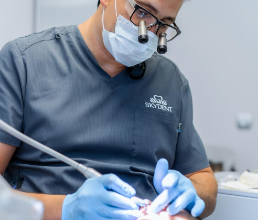What Your Insurance Really Covers When Getting Partial Dentures in Phoenix

Understanding Your Dental Insurance Plan in Phoenix
Before you even start thinking about partial dentures, it’s really important to get a handle on what your dental insurance actually covers here in Phoenix. Plans can vary a lot, and knowing the details upfront can save you from some serious financial surprises later on. It’s not the most exciting topic, I know, but trust me, it’s worth the effort.
Deductibles and Coinsurance Explained
Okay, let’s break down some of the basics. Your deductible is the amount you have to pay out-of-pocket before your insurance starts kicking in. So, if your deductible is $100, you’ll pay the first $100 of your dental work. After that, coinsurance comes into play. Coinsurance is the percentage you and your insurance company each pay for covered services. For example, if your coinsurance is 80/20, your insurance pays 80%, and you pay 20%.
Annual Maximums and Limitations
Most dental insurance plans have an annual maximum—the total amount the insurance company will pay for your dental care in a year. Once you hit that maximum, you’re responsible for all remaining costs. It’s also important to be aware of any limitations. Some plans might limit coverage for certain procedures or have waiting periods before certain benefits become available. For example, some plans might not cover major work like dentures for the first year.
In-Network Versus Out-of-Network Providers
This is a big one. Dental insurance plans usually have a network of dentists they’ve made agreements with. These are called in-network providers. If you see an in-network dentist, you’ll typically pay less because they’ve agreed to discounted rates with the insurance company. If you go to an out-of-network dentist, you might have to pay more, or your insurance might not cover as much. Some plans don’t cover out-of-network at all, so it’s important to check. Finding a good dentist in Phoenix who’s in your network can save you a lot of money.
Understanding these basics is the first step in making informed decisions about your dental health and your wallet. Don’t be afraid to call your insurance company and ask questions. They’re there to help you understand your plan.
Types of Partial Dentures and Coverage Implications
Cast Metal Partial Dentures
Cast metal partial dentures are known for their durability and stability. They usually have a metal framework with acrylic resin holding the replacement teeth. The framework is custom-made to fit snugly around your existing teeth. Because of the materials and custom fit, they often come with a higher price tag, which can affect how much your insurance covers.
- They are strong and long-lasting.
- They provide good support for replacement teeth.
- They can be more expensive than other types.
Insurance companies often view cast metal partial dentures as a necessary treatment due to their functional benefits. This can mean a higher chance of coverage compared to options considered purely cosmetic. However, the specifics depend on your plan’s details.
Flexible Partial Dentures
Flexible partial dentures are made from a thermoplastic material, making them more comfortable for some people. They don’t have metal clasps, which can be more aesthetically pleasing. However, they might not be as durable as cast metal dentures. The flexibility can also affect how well they distribute chewing forces.
- They are more comfortable for some.
- They don’t have visible metal clasps.
- They might not be as durable as metal options.
Insurance coverage for flexible partial dentures can vary. Some plans might cover them similarly to other types, while others might have limitations due to their perceived cosmetic benefits. It’s always a good idea to check with your insurance provider.
Acrylic Partial Dentures
Acrylic partial dentures are typically the most affordable option. They are made entirely of acrylic resin and are often used as a temporary solution while waiting for a more permanent denture. They are less durable than metal or flexible dentures and might not fit as precisely.
- They are the most affordable option.
- They are often used as a temporary solution.
- They are less durable than other types.
Acrylic partial dentures are often covered by insurance, especially if they are considered a necessary step in a treatment plan. However, because they are sometimes seen as temporary, the coverage might be less than for more permanent options. Understanding the partial dentures cost with insurance for each type is important for budgeting and making informed decisions.
Navigating Pre-Authorization for Partial Dentures
Why Pre-Authorization is Crucial
Getting pre-authorization, or pre-approval, from your dental insurance company before you get partial dentures is super important. It’s basically asking your insurance company if they’ll actually pay for the procedure before you go ahead and get it done. If you skip this step, you might find out later that your insurance won’t cover the cost, leaving you with a hefty bill. It helps you understand what portion of the cost will be covered, and what your out-of-pocket expenses will be. It also gives you a chance to explore alternative treatment options if your insurance denies the initial request. Think of it as a safety net for your wallet.
Steps for Obtaining Pre-Authorization
Getting pre-authorization usually involves a few steps. It’s not too bad, but you need to be organized.
- First, your dentist will send your insurance company a treatment plan that includes details about the partial dentures you need.
- The insurance company reviews this plan to see if it meets their coverage criteria.
- They might ask for more information, like X-rays or a written justification from your dentist.
- Once they have everything they need, they’ll make a decision and let you and your dentist know if the treatment is approved, denied, or partially approved.
Potential Delays and How to Address Them
Sometimes, the pre-authorization process can take a while. Insurance companies aren’t always the fastest. Here’s what might cause delays and what you can do about it:
- Missing Information: Make sure your dentist sends all the required documents the first time. Double-check with the office to confirm everything was submitted.
- Insurance Company Backlog: Sometimes, insurance companies are just busy. Call them to check on the status of your request. A polite phone call can sometimes speed things up.
- Disagreements on Treatment: If the insurance company questions the treatment plan, your dentist might need to provide more detailed explanations or consider alternative options.
If you experience significant delays, don’t hesitate to contact your insurance company directly. Document every conversation, including the date, time, and the name of the representative you spoke with. This record can be helpful if further issues arise.
Essential Questions to Ask Your Dentist in Phoenix
Cost Breakdown and Payment Options
Okay, so you’re thinking about getting partial dentures. The first thing on everyone’s mind? Money. Don’t be shy about asking for a detailed breakdown of all the costs involved. I mean everything. The exam, the dentures themselves, any adjustments needed afterward.
- What’s the total cost?
- What does my insurance cover?
- What payment options do you have?
Some offices offer payment plans, or work with financing companies. It’s good to know all your options upfront. You don’t want any surprises later on.
Insurance Claim Submission Process
Dealing with insurance can be a headache. Find out exactly how your dentist’s office handles claims. Do they submit the paperwork for you? Or are you responsible for doing it yourself? If they do it, make sure you understand what information they need from you. If you have to do it, get clear instructions from them on what forms to use and where to send them. Knowing this process can save you a lot of time and frustration.
Post-Procedure Care and Follow-Up
Getting partial dentures isn’t a one-and-done thing. You’ll need to take care of them, and you might need adjustments over time. Ask your dentist about:
- How to clean your dentures.
- What to do if they feel uncomfortable.
- How often you should come in for check-ups.
It’s also good to know what to expect in the first few days or weeks after getting your dentures. Will your speech be affected? Will it be hard to eat? Knowing what’s normal can help you feel more confident and prepared.
Maximizing Your Benefits for Partial Dentures
Getting partial dentures can be a bit of an investment, so it makes sense to try and get the most out of your dental insurance. It’s not always straightforward, but with a little planning, you can potentially save some money.
Timing Your Treatment Strategically
Sometimes, when you schedule your treatment can make a difference. Most dental insurance plans run on a calendar year. If you know you need partial dentures, consider whether starting treatment near the end of one year and finishing in the next could help you use two years’ worth of annual maximums. This only works if your plan resets annually, of course. Check your plan details to confirm the dates of your benefit period. Also, keep in mind that some dental offices get really busy towards the end of the year, so booking in advance is a good idea.
Understanding Your Plan’s Waiting Periods
Many dental insurance plans have waiting periods before certain procedures are covered. This means that even if you have insurance, you might have to wait a certain amount of time (like six months or a year) before you can get coverage for something like partial dentures. Make sure you know how long your waiting period is. If you’re already past the waiting period, great! If not, you might need to plan accordingly. It’s a bummer to find out you have to wait longer than you thought.
Combining Benefits with Other Procedures
Sometimes, getting other dental work done at the same time as your partial dentures can help you maximize your benefits. For example, if you need extractions or fillings, doing them together might be more efficient and could potentially help you reach your annual maximum faster. Talk to your dentist about whether there are any other procedures you need that could be done at the same time. It’s all about planning and making the most of what your insurance offers.
It’s always a good idea to keep detailed records of all your dental appointments and insurance claims. This can be helpful if you ever need to dispute a claim or track your spending. Also, don’t be afraid to call your insurance company if you have any questions. They’re there to help, even if it doesn’t always feel like it.
Common Exclusions in Dental Insurance Policies
Dental insurance, while helpful, doesn’t cover everything. It’s important to know what your policy won’t pay for before you need partial dentures. This can save you from unexpected bills and help you plan your treatment better.
Cosmetic Limitations and Coverage
Many dental insurance plans consider certain procedures “cosmetic” and won’t cover them. This is a big deal when it comes to dentures. If the primary reason for getting partial dentures is to improve your smile’s appearance rather than restore function, your insurance might deny the claim. It’s important to understand what your insurance considers cosmetic versus medically necessary. For example, if you’re missing teeth due to an accident or disease, the dentures are more likely to be covered than if you simply want a brighter, more uniform smile.
Pre-Existing Condition Clauses
Some dental insurance policies have clauses that exclude coverage for conditions that existed before you enrolled in the plan. This can be tricky with partial dentures. If you were already missing teeth when you got the insurance, the policy might not cover the cost of replacing those teeth with dentures. It really depends on the specific wording of your plan. Always check the fine print and ask your insurance provider about any pre-existing condition limitations.
Frequency Limitations on Replacements
Dental insurance plans often have frequency limitations on how often they’ll pay for certain procedures. This is especially relevant for dentures, which may need to be replaced periodically due to wear and tear or changes in your mouth. Most plans won’t cover a new set of dentures if you’ve had them replaced within a certain timeframe, like five or ten years. Here’s a simple example:
| Procedure | Frequency Limitation |
| Denture Replacement | Once every 7 years |
Understanding these limitations is key to planning your dental care. If you know your insurance won’t cover a replacement for several years, you can budget accordingly or explore alternative options.
Here are some things to keep in mind:
- Review your policy documents carefully.
- Ask your dentist about the expected lifespan of your dentures.
- Contact your insurance provider to confirm the specific frequency limitations on denture replacements.
Finding a Reputable Dentist in Phoenix for Dentures
Choosing the right dentist is a big deal when you’re getting partial dentures. You want someone who knows their stuff and makes you feel comfortable. It’s not just about the procedure; it’s about the whole experience. Let’s look at what to consider when finding a good dentist in Phoenix.
Evaluating Dentist Credentials and Experience
First, check out their credentials. Where did they go to school? How long have they been practicing? Experience matters, especially with something as specific as dentures. Look for a dentist in Phoenix who has a solid background in prosthodontics or restorative dentistry. It’s also good to see if they keep up with the latest techniques and technologies. You can usually find this information on their website or by asking their office directly.
Patient Reviews and Testimonials
What are other people saying? Online reviews can give you a sense of what to expect. Check out Google, Yelp, and other review sites. Pay attention to patterns. Are people consistently praising their chair-side manner? Are there repeated complaints about billing or communication? While one or two negative reviews aren’t necessarily a deal-breaker, a consistent stream of them should raise a red flag.
Consultation and Treatment Planning Process
Schedule a consultation. This is your chance to meet the dentist, ask questions, and get a feel for their approach. A good dentist in Phoenix will take the time to listen to your concerns, explain your options clearly, and develop a treatment plan that fits your needs and budget. They should also be upfront about costs and insurance coverage. If they rush you or seem dismissive, it might be best to look elsewhere.
Finding the right dentist is a personal thing. What works for one person might not work for another. Trust your gut. If you feel comfortable and confident with a particular dentist, that’s a good sign.
Wrapping Things Up
So, there you have it. Figuring out what your insurance actually covers for partial dentures in Phoenix can feel like a lot. It’s not always straightforward, and honestly, it takes some digging. But knowing what to look for, asking the right questions, and maybe even getting a second opinion can really help. Don’t just assume your plan will cover everything, because it probably won’t. A little bit of homework now can save you a big headache later, and get you closer to that smile you want without breaking the bank.
Frequently Asked Questions
Why is it a good idea to get pre-authorization from my insurance company?
It’s super important because it lets you know if your insurance will pay for your partial dentures before you get them. This way, you won’t be surprised by a big bill later.
Will my dental insurance cover the whole cost of partial dentures?
Usually, you’ll need to pay a part of the cost yourself. This is called a deductible or coinsurance. Your insurance might also have a limit on how much they’ll pay in a year.
Are all types of partial dentures covered by insurance?
It depends on your plan. Some plans cover all types, while others might only cover the cheaper ones, like acrylic. You should check your specific plan details.
Does having a problem with my teeth before I get insurance affect coverage?
Sometimes, yes. If you’ve had dental problems for a while, your insurance might not cover them right away. It’s best to ask your insurance company directly.
Do I have to wait a certain amount of time before my insurance will pay for partial dentures?
Yes, many plans have a waiting period, meaning you have to be enrolled for a certain amount of time before they’ll pay for big procedures like partial dentures.
What should I ask my dentist about the cost and payment for my partial dentures?
You should ask about the total cost, what your insurance will pay, and what you’ll owe. Also, ask about payment plans and how they’ll send the bill to your insurance.





